Product Hunt
Today, Product Hunt is a thriving community where product enthusiasts, seed-stage investors, and everyday tech consumers come together to share and discover new, innovative products and services. When it was first getting started, the team saw a need for a dedicated space for enthusiastic consumers, and used a detailed launch plan to make their vision a reality.
The plan covers all angles the Product Hunt team considered prior to launching, from the initial target audience to a detailed product glossary to a go-to-market strategy. Any team looking to make a big impact with their product launch can look to this plan as a guide to follow in the steps of Product Hunt's success.
Product Hunt
“for people who love products”
Intro & Goal
Our goal is to make Product Hunt the destination to share and discover new, innovative products and services, from mobile apps to hardware products. Others in this space focus on editorial curation, following more of a blog-like model. Product Hunt is a community, a place to geek out about products with other enthusiastic people.
Who’s it for?
- Product people - those building products that enjoy discovering, playing with, and learning from new, innovative products. Also serves as a pulse on potential competing products
- Seed-Stage Investors - always sourcing new deals and seeking signals to curate what startups to evaluate and meet.
- Everyday Tech Consumers - people that love to find new stuff
Why build it?
- It’s something we personally enjoy using
- Early, initial traction from “linkydink MVP” - 175+ subscribers, 30 contributors (some VC’s and founders)
- Community verticals on the rise. GrowthHackers.com, Designer News, and Quibb have gained traction in specific startup/tech verticals.
- Monetization opportunities in advertising and/or data
- Tech-risk very low
What is it?
Glossary
- Post - new product hunt submissions
- Comments - comments on a post
- Replies - replies to comments
- Vote - votes for a post
- Index View - homepage of Product Hunt (all users can view this)
- Detailed View - permalink page for each post
- Profile View - user profile page
User Types
- Non-Registered Users - people that have no yet registered
- Registered Viewers - people that have registered and can vote on posts but cannot post or comment.
- Contributors - registered users that can post, comment, and upvote (ie, “Hunters”?)
- Admins
Index View
The Index View (ie, homepage) displays the list of posts chronologically, segmented by day (a la linkydink).
When not signed in, a CTA must be presented to signup. When signed up, a CTA to post must be present.
The “Hunters” (ie, contributors) must also be listed, highlighting the community of product people curating the content.
Detailed View
The Detailed View (ie, permalink page) displays information about the post (same as noted below) but with comments expanded.
Additionally, this page should include “who’s here,” showing profile pics of the people engaging in the conversation and/or voted
Posts
Each post must contain:
- Name - name of the product or service
- Tagline - short (<60 character?) description of the product or service
- URL - duh
- Submitted By - person that submitted the post with their profile picture and/or name
- Votes - number of votes for that post w/ profile pics of each user that voted
- Comments - number of comments for that post (maybe with profile pics of those that commented)
After submitting a post, the user should be instructed to say something interesting, adding the first comment to spark conversation.
Comments
Every post has a comment feed, algorithmically ranked like HN to surface the top comments. Each comment includes:
- Comment Text - CTA should frame the conversation (e.g. “say something interesting about Coin”)
- Submitted By - user that commented
- Votes - users can vote up comments
- Replies - replies are chronologic, one-layer deep (ie, no threaded replies)
Following
Users can follow other users. This does not change the Index View (the feed of posts) but will be used to re-engage users when people they follow take actions like post, upvote, or comment.
Email Notifications
Users receive the following email notifications:
- Daily Product Hunt digest - list of all posts for the day (later could be top 10 products and could be changed to weekly digest if the user prefers)
- Social Re-engagement
- Follows
- Votes on Their Posts
- Comments on Their Posts
- Comments on Posts They Voted On
- Replies to Comments They Made
Registration
Every user must register with Twitter, pulling in the following information:
- Name
- Profile Pic
- Twitter URL
- Twitter Username (for tagging/mentions in the future maybe)
Additionally, they must also provide:
- Email Address
- Title and Company Name
Brainstormed Ideas
- Guide and Structure Comments - preface comments with structure (e.g. “this product is similar to…”, “this product is awesome because…”) a la Facebook’s “I’m watching…”, “I’m eating…”
- Related Links - press, blog posts, etc
- Algorithmic (HN-like) Ranking
- Editors Picks - “starring” editorial picks
- Product Hunt Groups - people can create groups, similar to subreddits
Competitors & Product Inspiration
- Beta List - paid promotion (and maybe some editorial) of early, often in beta, startups
- StartupList - editorial curation of new startups
- TastemakerX - music discovery community
Seeding Users & Content
Initial contributors will be hand-picked to create exclusivity and reduce potential spam. Ideal contributors will be recognizable product people (e.g. Nir Eyal, Semil Shah, Hiten Shah) and investors (e.g. Josh Elman, Nick Chirls) in the startup space but may also include lesser known, early tech adopters.
To capture higher profile startup personalities like Hunter Walk we may submit product finds on his behalf with permission (e.g. based on something he’s tweeted).
Mockups
Index View
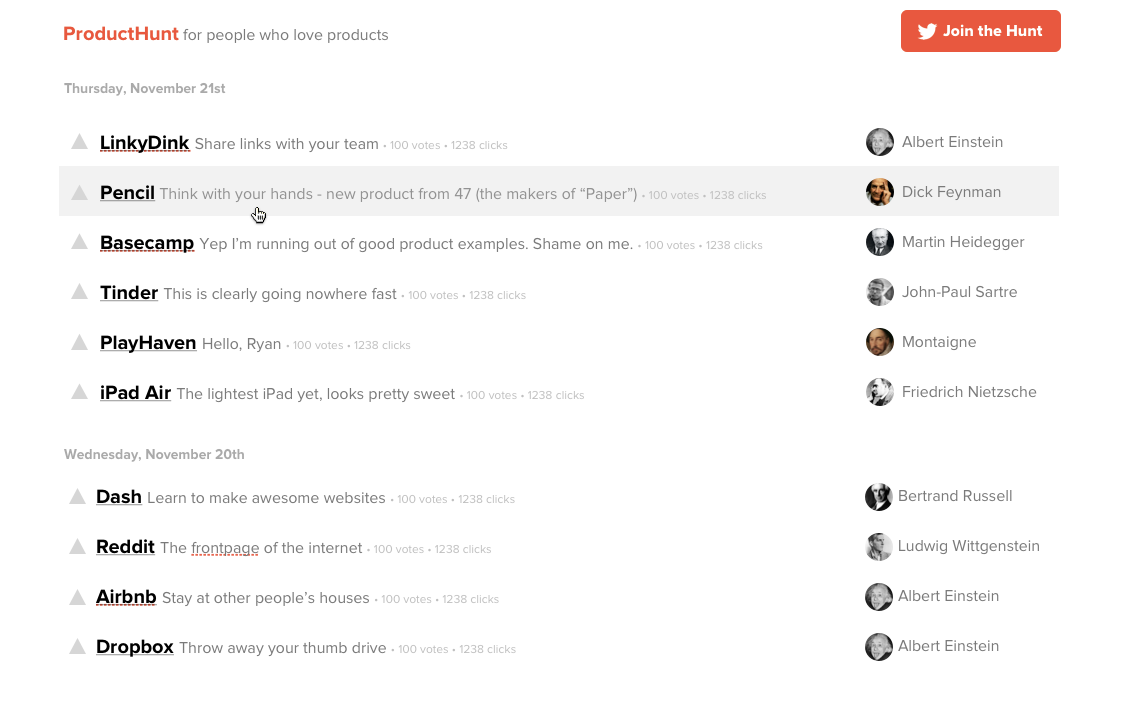
Detail View
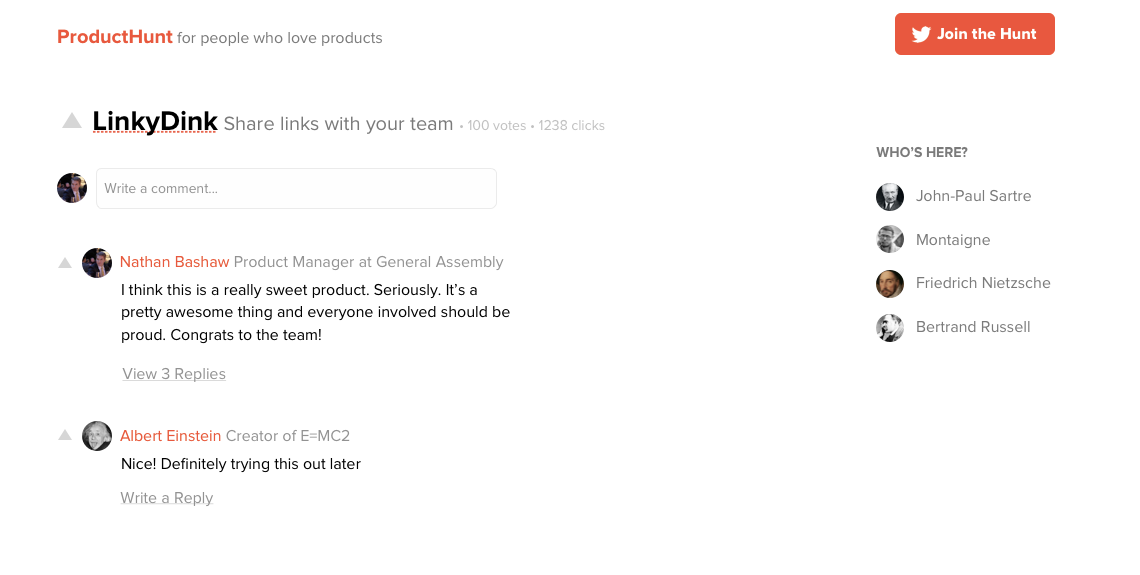
Tech Notes
Models
- User
- twitter_uid
- name
- username
- image
- headline
- daily_email?
- Post
- user_id
- name
- tagline
- clicks
- url
- PostVote
- user_id
- post_id
- Comment
- user_id
- body
- CommentVote
- user_id
- comment_id
- Reply
- comment_id
- user_id
- body
Go to Market
- Engage/Recruit Influencers - make them feel part of the product’s success and design
- Ask for direct product feedback
- Feedback on blog post/press release
- Invite Contributors Before Public Launch - ensure content is populated
- Blog Post - “30 Minute MVP”
- Post on PandoDaily or Andrew Chen’s blog?
- Submit to Hacker News, GrowthHackers.com, Designer News, Quibb
- Press Release
- Reach out to press contacts (PandoDaily, FastCo)
- Mass distro other press (see http://customerdevlabs.com/2013/09/24/google-news-api-mturk-press/)
- Startup Edition and Ryan’s Personal Email List - ~4k subscribers
- Email Existing Linkydink Users
Post-Launch Marketing
- Product Deconstructions Blog Posts
------------------------------------------------------------------------------------------------------
OLD STUFF BELOW
------------------------------------------------------------------------------------------------------
Architecture
- Homepage Landing page (not signed in)
- Homepage Feed (signed in) - list of posts
- Product Post Permalink - deeplink to a specific post
- User Profile
- User Settings - update email address, notification preferences
- About/FAQ
Homepage - Not Logged In
Homepage (producthunt.co) when the user is not logged in, doesn’t let the user browse the full feed of products, pushing users to register (see andrewchen.co’s blog - he’s had success putting up this walled garden). Users can still view permalink pages though.
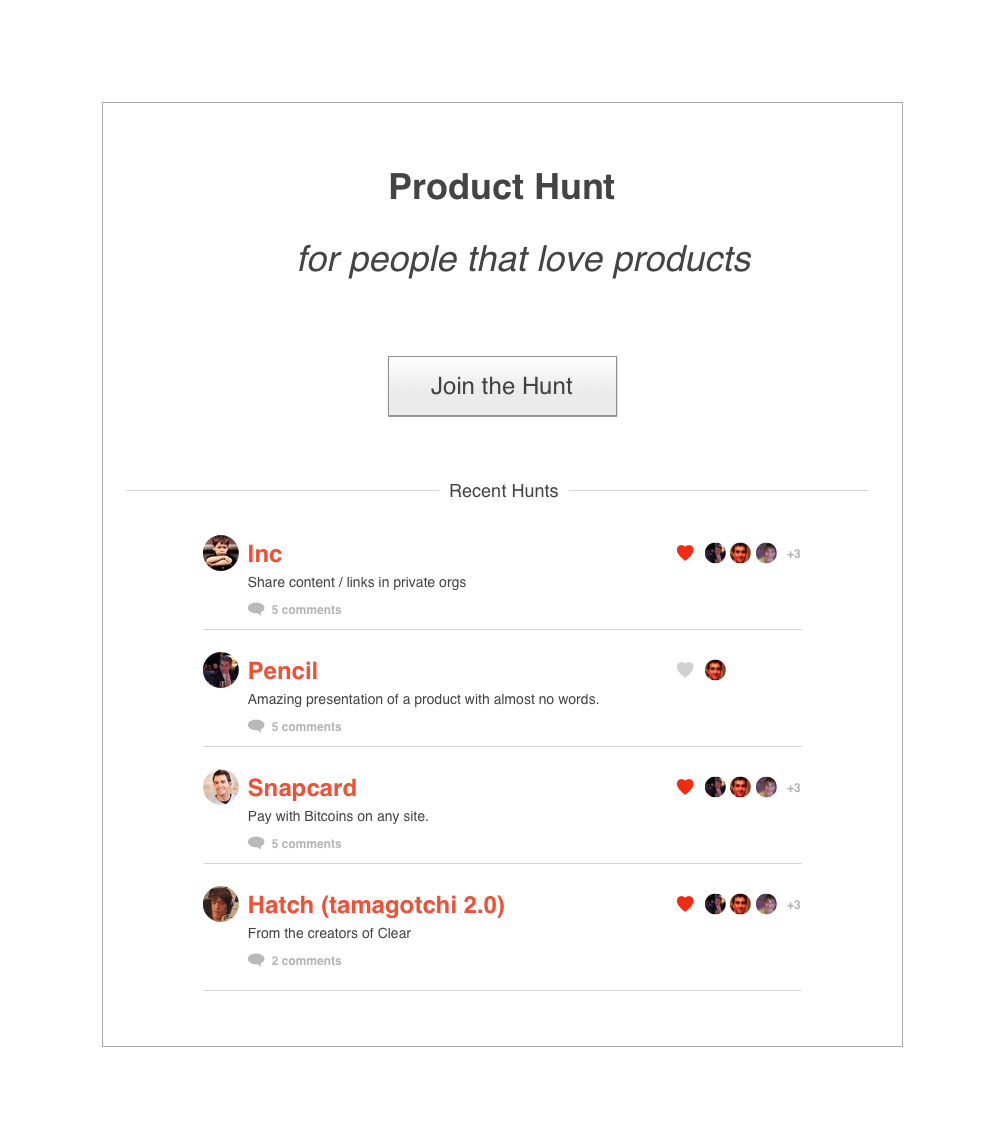
Homepage Feed (Viewing Posts) - Logged In
Initially, everything is displayed chronologically rather than algorithmically or based on votes. Since the user base will be relatively small at first, we won’t have enough people voting to meaningfully rank products (yet).
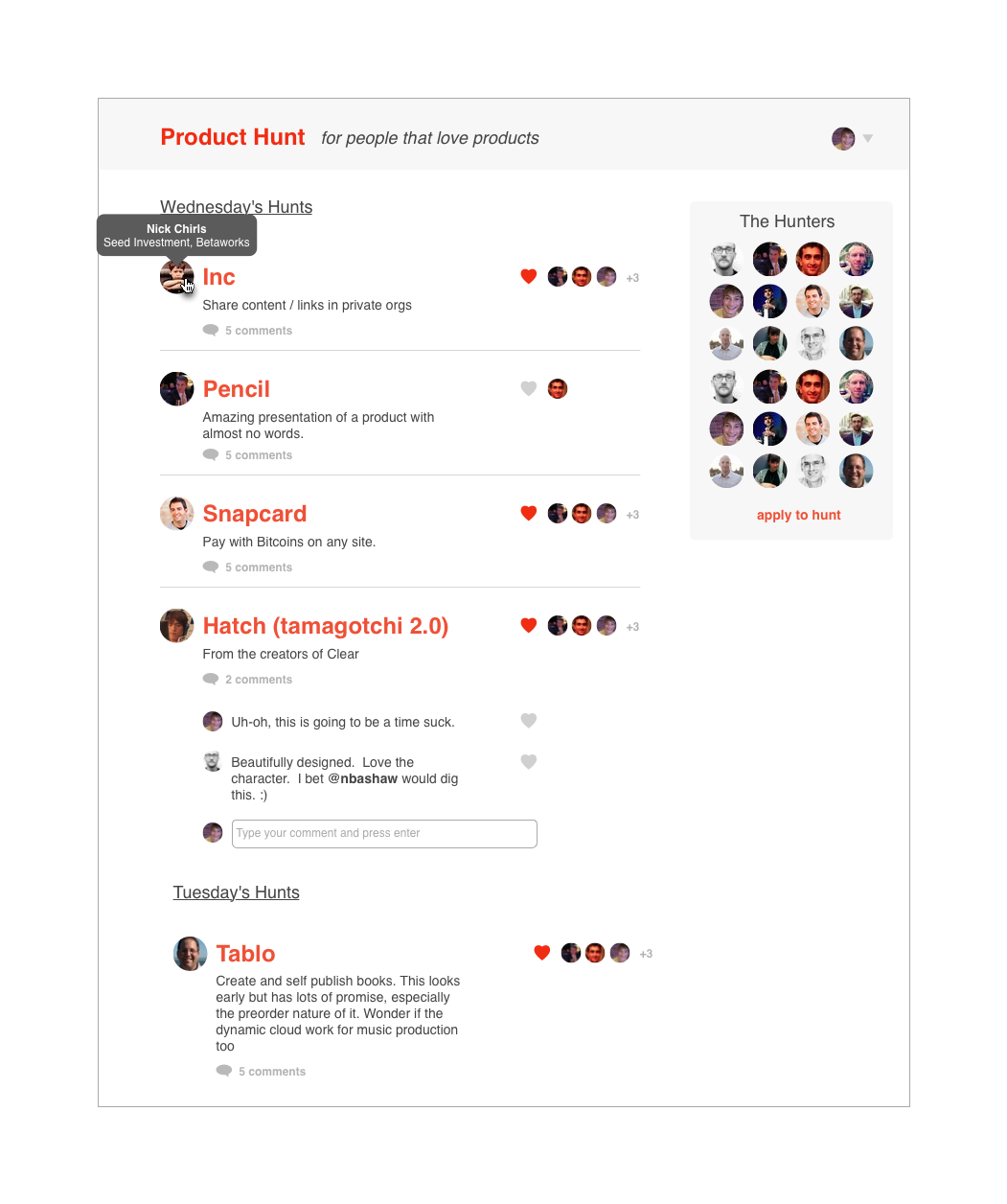
Permalink Page
Each post has it’s own URL to share. Will be useful for encouraging hunters to post links to their findings (e.g. “I just posted Coin to Product Hunt - http://producthunt.co/posts/coin).
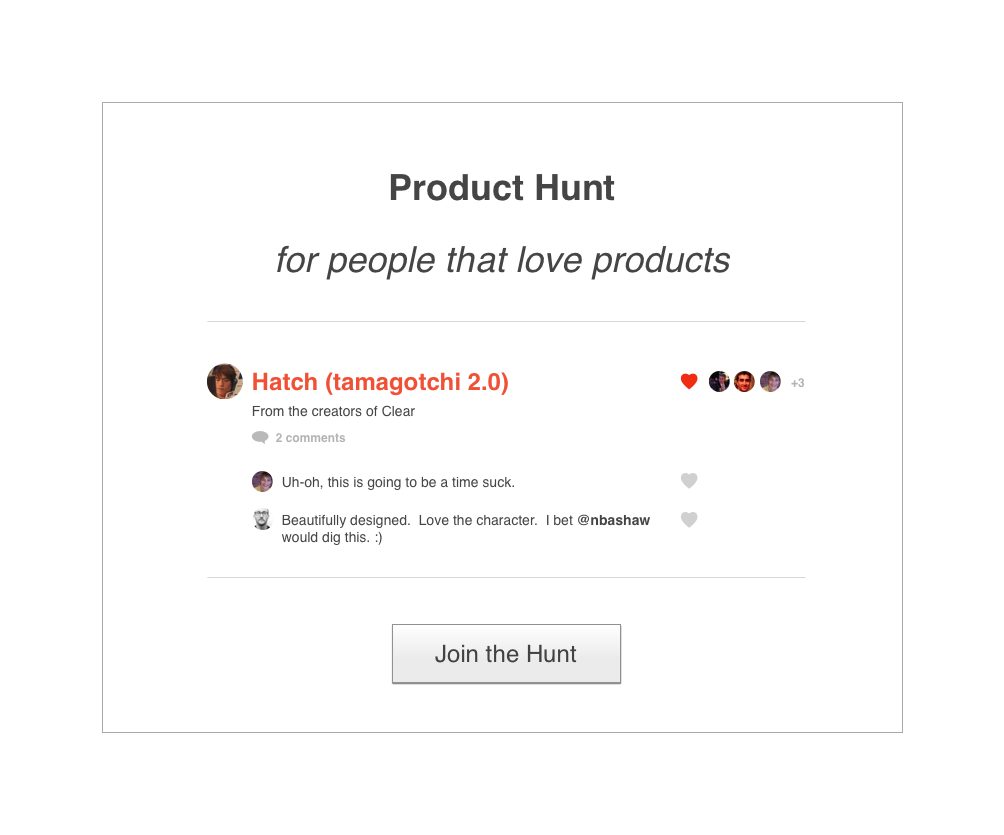
Interactions & User Feedback Loops
The success of Product Hunt relies on effective feedback loops and re-engagement with the service, something heavily lacking in the linkydink MVP. Users can interact in the following ways:
v1
- Submit Posts
- Comment on Posts
- Upvote Posts
Post-v1
- View a Post - a la Quibb, show who viewed a post and if not registered, anonymize. Could also just be the count.
- Upvote Comments
- Follow Users
- Mention Users - ability to tag a user in a post description or comment (e.g. “@ryan posted a similar product, XYZ”)
- Forward to Users - notify specific users (a la Potluck) of a product/post they might be interested in, could be seamlessly part of the posting flow
Submitting a Post
Each post includes:
- URL
- Title/Name - 100 char max
- Description - 250 char max
- Submitted By
- Upvote Count & Who Voted
- Comments
No deduping of URL’s (e.g. if a user already submits a link to mindie.co, it shouldn’t prevent another person from submitting again) is necessary for v1 but something to consider in the future
Commenting on a Post
Any registered user can comment on a post in a chronological discussion (threaded or not?)
Upvoting/Liking a Post
Any registered user can upvote/like a post, incrementing its vote count by one.
Email Notifications
Users receive the following email notifications:
- Daily Product Hunt digest - list of all posts for the day (later could be top 10 products and could be changed to weekly digest if the user prefers)
- Social Re-engagement - new follows, comments, post upvotes
Registering
Users must register with their Twitter profile and supply an email address. Their Twitter profile picture, @username, and bio is stored and used. Users should automatically follow people on Product Hunt that they already follow on Twitter to increase notifications and investment in the service.
Future Ideas
- Notification Feed - notifications of new social activity (comments, upvotes, etc.)
- Browser Extension/Bookmarklet
- Tweet to Post - ability to tweet at @producthunt to submit new posts
- Email to Post - ability to email submit@producthunt.co to submit new posts
- Mobile - the site should be responsive and adapt to a mobile interface but mobile usability isn’t necessary for v1.
Competitors & Product Inspiration
- Beta List - paid promotion (and maybe some editorial) of early, often in beta, startups
- StartupList - editorial curation of new startups
- TastemakerX - music discovery community
Seeding Users & Content
Initial contributors will be hand-picked to create exclusivity and reduce potential spam. Ideal contributors will be recognizable product people (e.g. Nir Eyal, Semil Shah, Hiten Shah) and investors (e.g. Josh Elman, Nick Chirls) in the startup space but may also include lesser known, early tech adopters.
To capture higher profile startup personalities like Hunter Walk we may submit product finds on his behalf with permission (e.g. based on something he’s tweeted).
Today, Product Hunt is a thriving community where product enthusiasts, seed-stage investors, and everyday tech consumers come together to share and discover new, innovative products and services. When it was first getting started, the team saw a need for a dedicated space for enthusiastic consumers, and used a detailed launch plan to make their vision a reality.
The plan covers all angles the Product Hunt team considered prior to launching, from the initial target audience to a detailed product glossary to a go-to-market strategy. Any team looking to make a big impact with their product launch can look to this plan as a guide to follow in the steps of Product Hunt's success.
